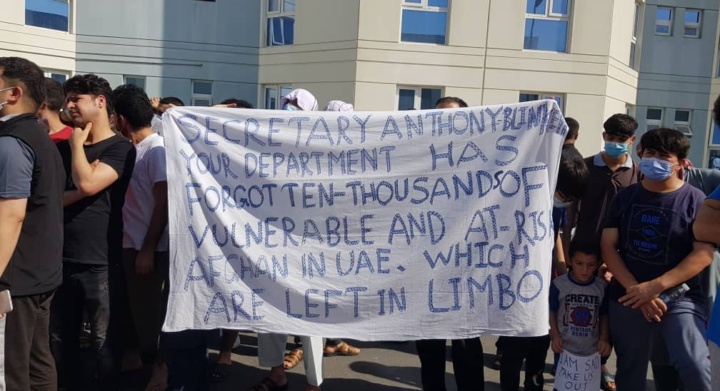Tens of thousands Afghan Evacuees at Emirates Humanitarian City Seek Answers to their U.S. Entry Status. Many are now in limbo in overflowing processing centers, fearful of what comes next.
Unlike other Afghan refugee camps in Ramstein Air Base in Germany and US army base in Qatar where evacuees have had relatively quick entry processes into the U.S., these individuals live in a state of fear and uncertainty as to their futures.
An estimated 9000 Afghan evacuees have spent the last 3 months at the Emirates Humanitarian City without insight as to whether they are being processed for entry to the US. #Afghanistan #SaveOurAllies @USAinUAE pic.twitter.com/7sj6WKK8hG
— Rise to Peace (@risetopeace) November 12, 2021
Afghan Evacuations
Thousands of Afghans were evacuated and fled Afghanistan after the Taliban regained control on August 16, 2021. After the fall of Kabul, the United States began evacuating Americans and Afghans, sending refugees across the globe to camps in Germany, Qatar, Spain, Uzbekistan, and UAE. While thousands of Afghans have already been vetted and brought to the United States, a much different situation has unfolded at the Emirates Humanitarian City refugee camp.
Emirates Humanitarian City Refugee Camp
An estimated 9,000 Afghan evacuees are currently housed at the Emirates Humanitarian City refugee camp in Abu Dhabi. These refugees were among the initial wave of evacuations by U.S. forces after the fall of Kabul. Ultimately, these evacuees have been housed at the Emirates Humanitarian City for three months and have since observed new Afghan refugee arrivals come and go in a matter of days.
While the Afghan refugees are grateful for the U.S.’s assistance in evacuating them from Afghanistan, the conditions at the refugee camp have become untenable, causing them to raise their voices and demand answers.
Living in Limbo
One of the loudest concerns from the evacuees at the Emirates Humanitarian City is the uncertainty of when they will be processed and brought to the United States, most notably for those who have valid documents or family sponsorship.
Evacuees have criticized the insufficient amount of personnel at the site to process and transfer them out of the camp.
Thus, the undefined timeline at Emirates Humanitarian City coupled with threats of deportation has resulted in a state of anxiety and distress among refugees. On top of this, reports from inside Emirates Humanitarian City state that several refugees have died from unknown causes. The news of their deaths has been intentionally suppressed by the media.
Ultimately, the situation at Emirates Humanitarian City has risen to a level where the refugees feel compelled to voice their concerns, especially regarding the camp’s educational, financial, and health issues.
Educational Concerns
One concern raised by the refugees is the now three-month, and seemingly indefinite, hiatus in education for the children at the Abu Dhabi camp. Since arriving, the children have lacked the opportunity to continue their studies, causing concern that they will fall behind educationally. While students have already had to navigate educational barriers caused by the coronavirus pandemic, this interruption in education at the refugee camp will exacerbate academic delays in students.
#NOW: Afghan refugees protested at Emirates Humanitarian City 👇
“We want our children to go school, said Afghan refugee to @risetopeace. “it has been 3 months that we are in here not knowing our future, added.”
An estimated 9000 Afghans were airlifted to Abu Dhabi pic.twitter.com/haYNzAe7dk
— Ahmad Shah Mohibi (@ahmadsmohibi) November 12, 2021
Financial Concerns
Another concern for individuals is that time spent in the refugee camp equates to money lost, due to the inability to work. This three-month gap in income negatively affects these individuals’ success once they immigrate to a new location and financially hinders family members from relying on their financial assistance.
One Abu Dhabi camp member voiced her concerns about employment impediments posed by the prolonged immigration delay.
Mina 45, was the breadwinner of her family as a governmental employee in Afghanistan but was forced to evacuate on August 21st as a result of the resurgence of the Taliban. Consequently, without Mina’s income, her family remaining in Afghanistan is impoverished.
Mina’s story is not unique, as countless individuals and families at Emirates Humanitarian City are unable to work and earn money to support their families. The refugees are eager to work and therefore motivated to transfer out of the camp to find employment and provide for their families.
Health Concerns
While at the Abu Dhabi camp, refugees have voiced their concerns over inadequate health care. Not only have several individuals died at the camp, but a handful have been deported back to Afghanistan due to mental health concerns. It is no surprise that the stress and anxiety of living in the refugee camp, in combination with the strains of fleeing one’s home, has led to mental health concerns and a state of depression among many Afghans at the camp.
To recap events, individuals at the Abu Dhabi camp have previously lived in a war zone, were forced to flee from their country, and are now placed in a refugee camp with no set date for leaving. Research has found that refugees often experience high levels of anxiety, depression, and post-traumatic stress disorder. This is undoubtedly true for the refugees at Emirates Humanitarian City.
Going Forward
Ultimately, while the evacuees are deeply grateful for the help from the United States, they seek transparency on whether they are being processed for entry into the United States. However, being left in a state of limbo for the past three months, while thousands of other refugees have had speedier transfer processes, has left the Abu Dhabi camp refugees confused and frustrated. As a result, the refugees are calling for increased personnel at their camps to expedite their vetting and transfer process by U.S. officials.
Presently, the Afghan evacuees at Emirates Humanitarian City have reached a point where silence and inaction are no longer an option. And while their gratitude remains, their patience has dwindled, leading to plans of a hunger strike if continued inaction persists.
_____________________________________________________________________________________
Ahmad Shah Mohibi, Founder Rise to Peace
Rise to Peace Counter-Terrorism Research Fellow




